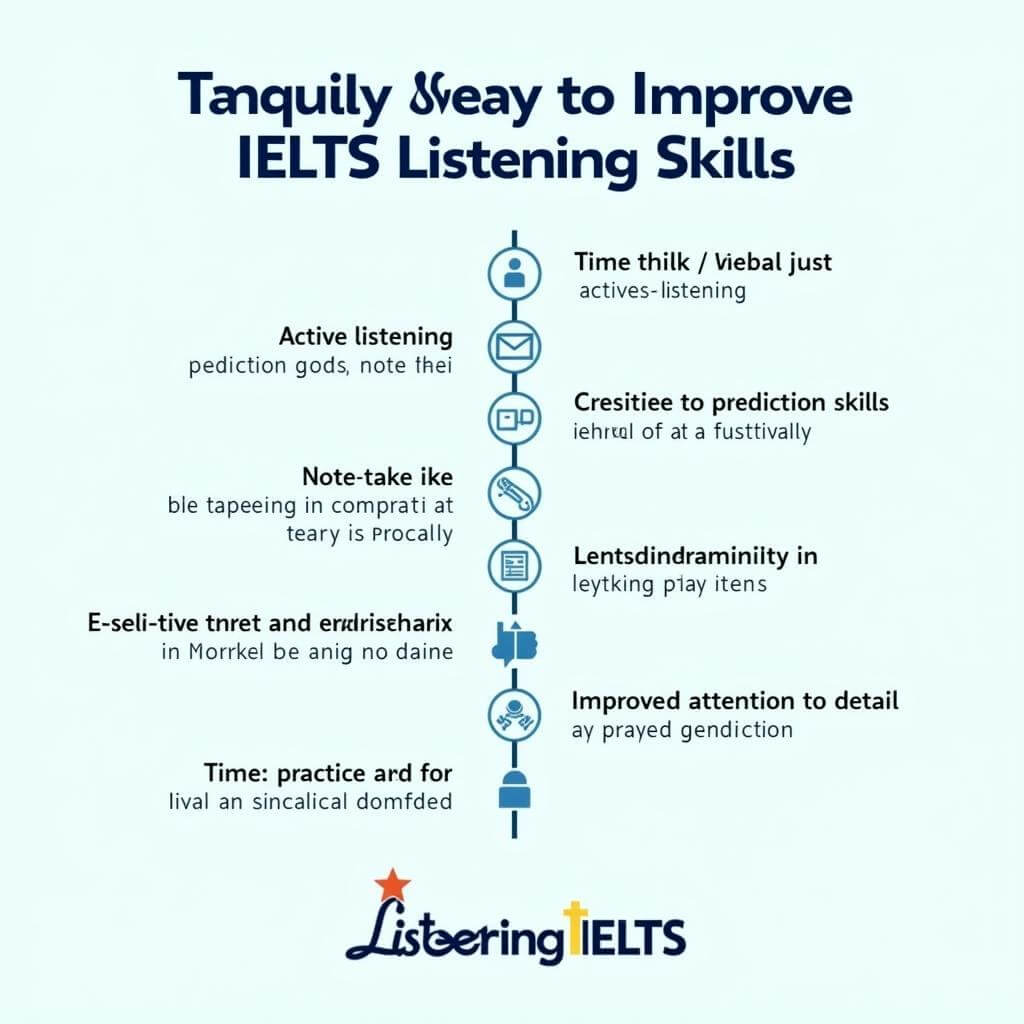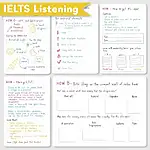As an experienced IELTS instructor, I can confidently say that improving attention to small details is crucial for success in the IELTS Listening test. This skill can make the difference between a good and an excellent score. Let’s explore some effective strategies to enhance your ability to catch those important nuances.
Why Attention to Detail Matters in IELTS Listening
The IELTS Listening test is designed to assess your ability to understand spoken English in various contexts. Often, the correct answers hinge on small details that can be easily missed if you’re not paying close attention. These details may include:
- Specific numbers or dates
- Subtle differences in pronunciation
- Negatives or qualifiers that change the meaning of a sentence
- Singular vs. plural nouns
- Tenses and verb forms
By improving concentration during long recordings, you’ll be better equipped to catch these crucial details.
Strategies for Improving Attention to Small Details
1. Active Listening Practice
One of the most effective ways to improve your attention to detail is through active listening practice. This involves:
- Focusing intently on the audio
- Anticipating information
- Taking notes on key points
- Mentally summarizing what you’ve heard
Dr. Emma Thompson, a renowned IELTS expert, emphasizes the importance of active listening: “Active listening is not just hearing words; it’s about engaging with the content and constantly asking yourself questions about what you’re hearing.”
2. Develop Prediction Skills
Prediction is a powerful tool in improving overall listening fluency. Before each section of the listening test:
- Read the questions carefully
- Underline key words
- Think about the type of information you’ll need to listen for
- Anticipate possible answers
This preparation primes your brain to focus on specific details when they appear in the audio.
3. Enhance Note-Taking Techniques
Effective note-taking is crucial for capturing small details. Try these techniques:
- Use abbreviations and symbols
- Focus on keywords rather than full sentences
- Develop a personal shorthand system
- Practice speed writing
Remember, your notes are for your eyes only, so they don’t need to be perfect or comprehensible to others.
4. Train Your Ear for Different Accents
The IELTS Listening test features speakers with various English accents. To improve your ability to catch details across different accents:
- Listen to podcasts from different English-speaking countries
- Watch international news channels
- Engage with English content from diverse sources
Dr. James Lee, an IELTS preparation specialist, notes: “Exposure to a variety of accents not only improves comprehension but also trains your ear to pick up on subtle pronunciation differences that can be crucial in the test.”
5. Practice with Background Noise
In real-life situations, and sometimes in the IELTS test, you may need to listen for details amidst background noise. To prepare:
- Practice listening to English audio in cafes or public places
- Use apps that simulate background noise while you listen to practice tests
- Gradually increase the difficulty by adding more complex background sounds
This technique helps in boosting attention to detail naturally in challenging listening environments.
6. Improve Your Vocabulary
A strong vocabulary can significantly enhance your ability to catch small details. When you’re familiar with a wide range of words and phrases:
- You’re less likely to get confused by similar-sounding words
- You can more easily understand context and infer meaning
- You’ll be better equipped to recognize synonyms and paraphrases
Focus on learning vocabulary related to common IELTS Listening topics such as education, work, social issues, and everyday activities.
7. Use Visual Aids for Memory Enhancement
Visual memory can be a powerful tool in remembering details. Try these techniques:
- Create mental images of what you’re hearing
- Use mind maps to connect ideas
- Visualize numbers, dates, and names as you hear them
This multi-sensory approach can significantly improve your retention of small details.
8. Regular Timed Practice
Timing is crucial in the IELTS Listening test. To improve your ability to catch details under time pressure:
- Start with untimed practice to focus on accuracy
- Gradually introduce timing, aiming to complete tasks within the allocated time
- Eventually, practice with slightly less time than given in the actual test
This approach will help you improve listening accuracy naturally while also building speed.
Common Pitfalls to Avoid
When focusing on improving attention to small details, be aware of these common mistakes:
- Overanalyzing: Don’t spend too much time on one question at the expense of missing the next piece of information.
- Ignoring context: Small details make sense within the larger context. Don’t focus so narrowly that you miss the overall message.
- Panicking over missed information: If you miss something, stay calm and refocus on the current question.
- Neglecting question types: Different question types require attention to different kinds of details. Practice all types equally.
Conclusion
Improving attention to small details in IELTS Listening is a skill that can be developed with consistent practice and the right strategies. By implementing these techniques and learning how to improve attention to detail in IELTS listening, you’ll be well on your way to achieving a higher score. Remember, it’s not just about hearing the words, but truly understanding and capturing the nuances of spoken English.
 IELTS Listening Improvement Journey
IELTS Listening Improvement Journey
Frequently Asked Questions
How long does it typically take to improve attention to detail in IELTS Listening?
Improvement time varies, but with dedicated practice, noticeable progress can be seen in 4-6 weeks. Consistency is key.
Can I improve my attention to detail by only practicing IELTS Listening tests?
While IELTS practice tests are valuable, incorporating a variety of listening materials and real-life situations will yield better results.
Are there any specific exercises to enhance short-term memory for IELTS Listening?
Yes, exercises like memory games, number sequence recall, and summarizing short audio clips can help improve short-term memory for listening tasks.
How can I stay focused during long listening passages?
Break the passage into smaller segments mentally, maintain good posture, and use subtle physical cues like light finger tapping to stay alert.
Is it better to focus on individual words or overall meaning in IELTS Listening?
A balance is ideal. Focus on key words for specific details, but always keep the overall context in mind to avoid misinterpretation.
How can I improve my ability to distinguish between similar-sounding words?
Practice minimal pairs (words that differ by one sound), listen to pronunciation guides, and pay attention to context clues in sentences.
What should I do if I find myself constantly missing the first few questions in each section?
Use the time before each section to read ahead, predict answers, and mentally prepare. This can help you tune in more quickly when the audio begins.


